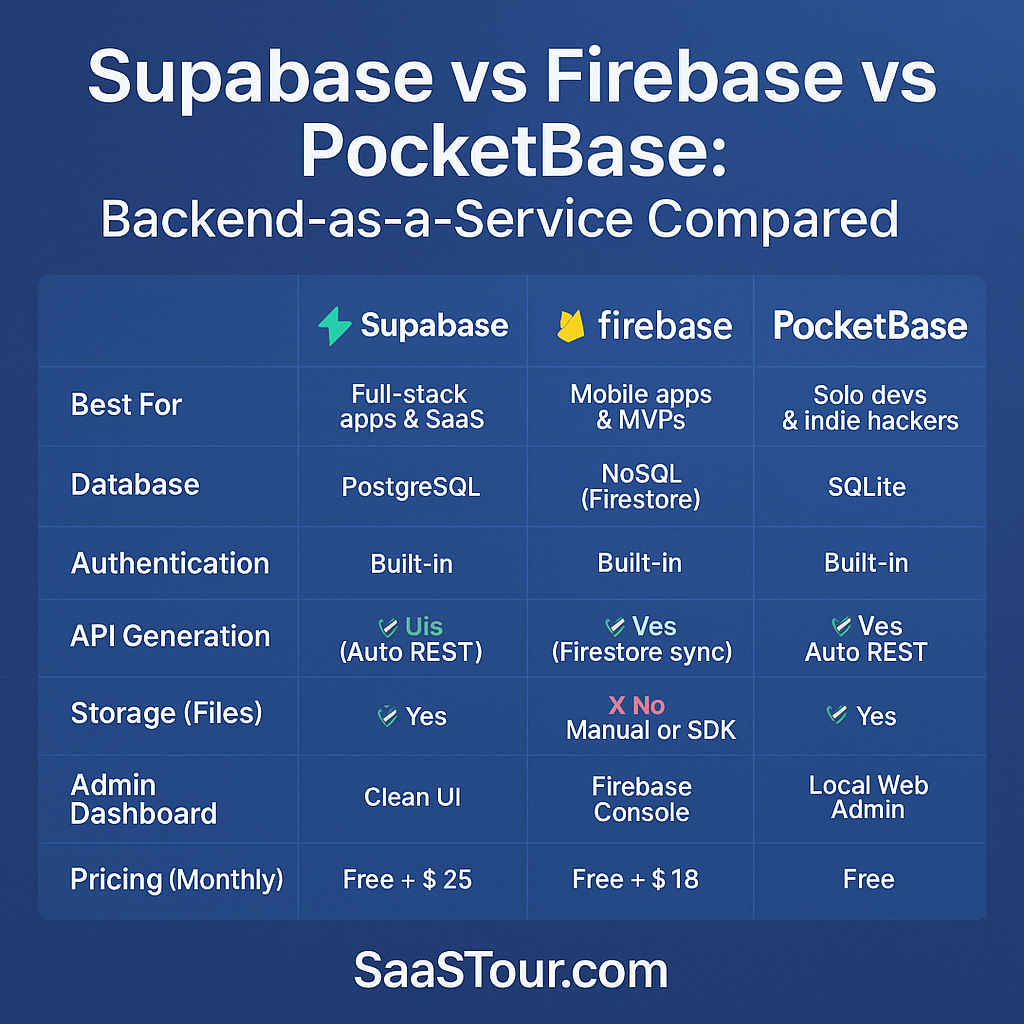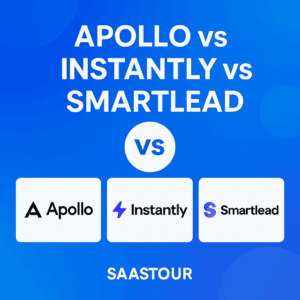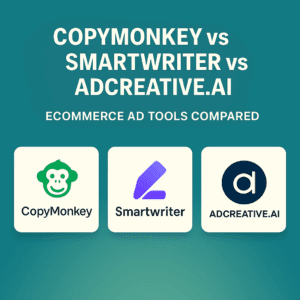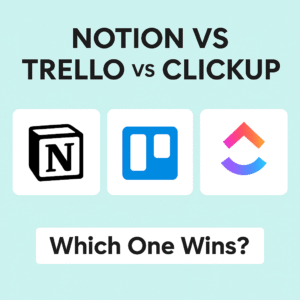Whether you’re building a full-stack SaaS, a mobile app MVP, or a side project, Backend-as-a-Service (BaaS) platforms save months of development time. But which one fits your tech stack and goals?
In this 2025 showdown, we compare Supabase, Firebase, and PocketBase — based on database, auth, real-time support, scalability, and developer experience.
Quick Comparison Table
| Feature | Supabase | Firebase | PocketBase |
|---|---|---|---|
| Best For | Full-stack apps & SaaS | Mobile apps & MVPs | Solo devs & indie hackers |
| Database | PostgreSQL | NoSQL (Firestore) | SQLite |
| Authentication | ✅ Built-in | ✅ Built-in | ✅ Built-in |
| Realtime Support | ✅ Yes (via Postgres) | ✅ Yes (Firestore sync) | ✅ Yes (WebSocket-based) |
| API Generation | ✅ Auto REST & GraphQL | ✖ Manual or SDK-only | ✅ Auto REST |
| Storage (Files) | ✅ Yes | ✅ Yes | ✅ Limited |
| Admin Dashboard | ✅ Clean UI | ✅ Firebase Console | ✅ Local Web Admin |
| Offline Support | ✖ Limited | ✅ Yes | ✅ Yes |
| Pricing (Monthly) | Free + Paid from $25 | Free + Paid from $18 | Free (Self-hosted) |
1. Supabase
Overview:
Supabase is an open-source Firebase alternative built on PostgreSQL, designed to give devs a relational backend with built-in auth, real-time updates, and auto-generated APIs.
Best For:
SaaS builders and developers who prefer SQL databases and full-stack architecture.
Key Features:
- PostgreSQL database with Row Level Security
- Auth (email, OAuth, magic links)
- Instant REST + GraphQL API
- Realtime via Postgres replication
- Edge functions, storage, and dashboard
Pros:
✔ SQL-native with full control
✔ Powerful role-based access
✔ Built-in storage and serverless functions
✔ Self-hostable via Docker
Cons:
✖ Slightly more complex for beginners
✖ Still maturing in scalability & docs
✖ Limited offline support
Pricing:
Free plan available
Paid starts at $25/month
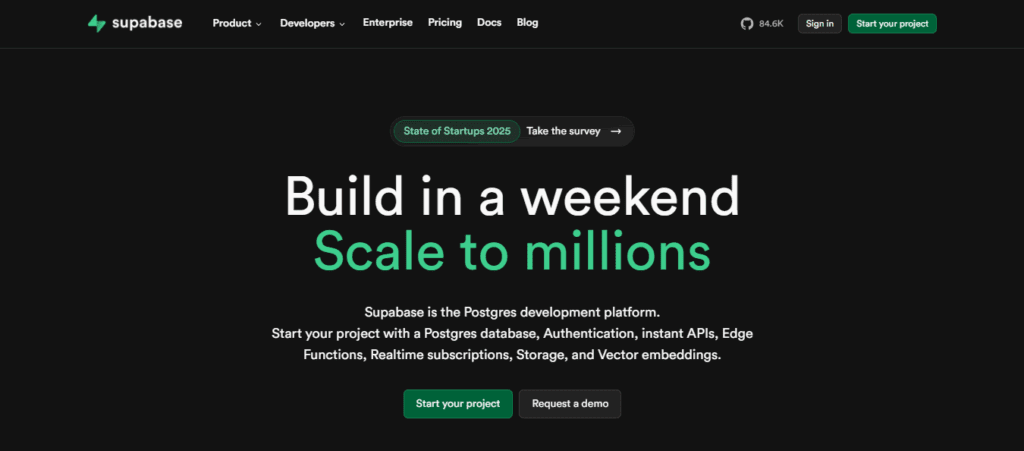
2. Firebase
Overview:
Firebase, by Google, is a mobile-first BaaS trusted by startups and Fortune 500s alike, offering real-time sync, analytics, and cloud functions.
Best For:
Teams building mobile apps, prototypes, or real-time apps.
Key Features:
- Firestore NoSQL database
- Realtime sync + offline caching
- Authentication + analytics
- Serverless functions
- Firebase Hosting + Cloud Messaging
Pros:
✔ Amazing for real-time mobile apps
✔ Google Cloud ecosystem support
✔ Offline sync by default
✔ Rich SDKs for Android, iOS, Flutter
Cons:
✖ No SQL-style querying
✖ Can get costly at scale
✖ Vendor lock-in (Google Cloud)
Pricing:
Free Spark plan
Paid starts at $18/month (Blaze)
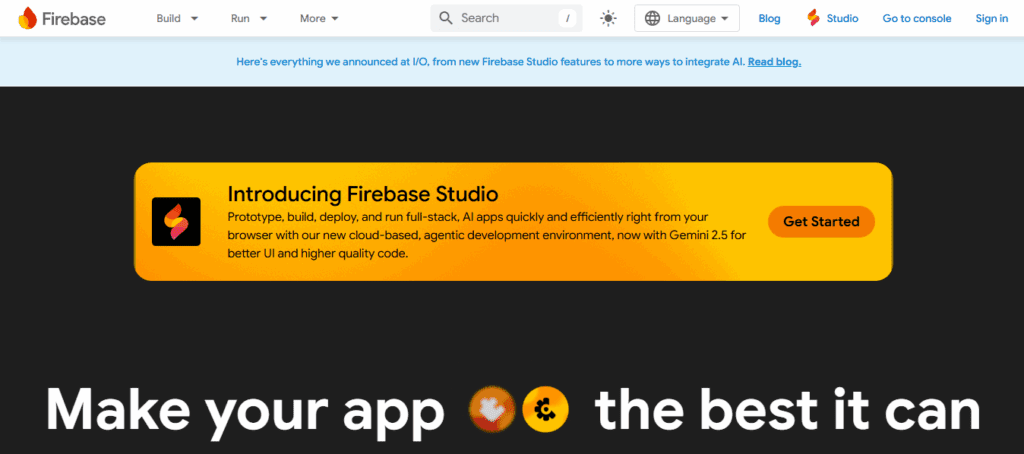
3. PocketBase
Overview:
PocketBase is a lightweight backend-in-a-box, written in Go, with a built-in database, auth system, REST API, and file storage.
Best For:
Solo devs and indie hackers who want a fully self-hosted BaaS.
Key Features:
- Embedded SQLite database
- Auth (email, OAuth, anonymous)
- Auto REST API
- Admin dashboard + file uploads
- Real-time updates via WebSocket
Pros:
✔ Super easy to host and run
✔ One binary executable (no setup)
✔ Great for desktop, local, or MVP apps
✔ Free & open-source
Cons:
✖ No GraphQL or cloud-hosted option
✖ Lacks horizontal scalability
✖ Minimal third-party integrations
Pricing:
Free (self-hosted only)
No official paid plan
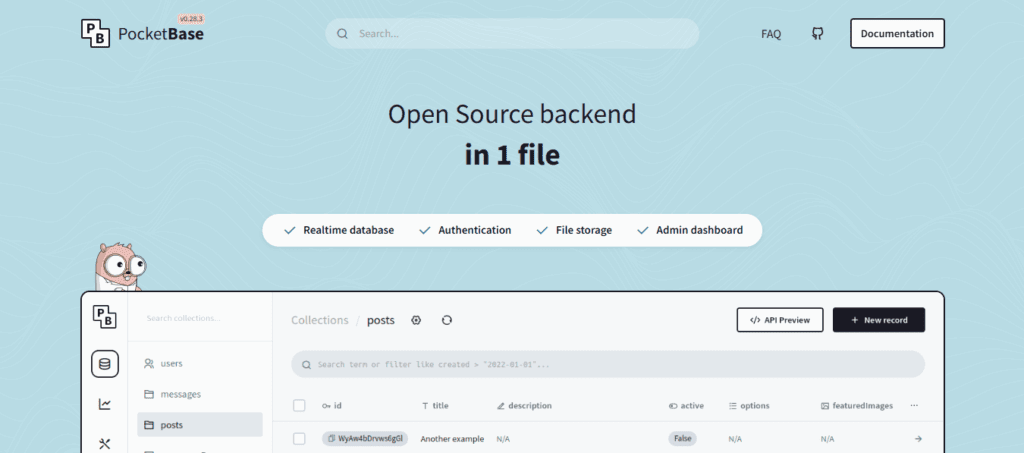
Use Case Recommendations
| Use Case | Best Tool |
|---|---|
| Full-stack SaaS with SQL backend | Supabase |
| Real-time mobile or Flutter apps | Firebase |
| MVPs, offline-first apps, CLI tools | PocketBase |
| Open-source backend with GraphQL | Supabase |
| Low-code + no vendor lock-in | PocketBase |
| Need analytics & push notifications | Firebase |
Final Verdict
- Choose Supabase if you want a PostgreSQL-powered open-source backend with real-time updates and full control.
- Use Firebase for mobile-first, real-time apps that need fast prototyping and cloud functions.
- Go with PocketBase if you’re building solo projects, self-hosted tools, or quick MVPs without complexity.
